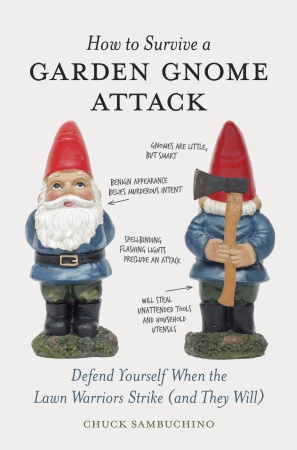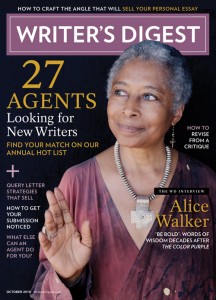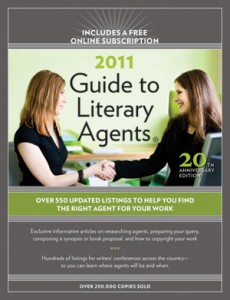 Chuck Sambuchino is the aspiring writer’s conduit to the world of literary representation. An editor and writer for Writer’s Digest Books, he edits two annual resources: Guide to Literary Agents and Children’s Writers & Illustrators Market, and his first book was the third edition of Formatting & Submitting Your Manuscript. He is a produced playwright and freelance writer with more than 600 articles in national and regional magazines over the last decade, including recent articles in Watercolor Artist, Pennsylvania Magazine, The Pastel Journal, Cincinnati Magazine, Romance Writers Report and New Mexico Magazine.
Chuck Sambuchino is the aspiring writer’s conduit to the world of literary representation. An editor and writer for Writer’s Digest Books, he edits two annual resources: Guide to Literary Agents and Children’s Writers & Illustrators Market, and his first book was the third edition of Formatting & Submitting Your Manuscript. He is a produced playwright and freelance writer with more than 600 articles in national and regional magazines over the last decade, including recent articles in Watercolor Artist, Pennsylvania Magazine, The Pastel Journal, Cincinnati Magazine, Romance Writers Report and New Mexico Magazine.
Chuck is also a humor author, with his book, How to Survive a Garden Gnome Attack, debuting September 7, 2010, from Ten Speed Press / Crown.
Besides that, he is a husband, cover band guitarist, chocolate-chip cookie fiend and owner of a flabby-yet-lovable dog named Graham.
Perhaps most importantly for aspiring writers, Chuck is known for his series of new agent interviews on his Writers Digest Guide to Literary Agents blog.
And today we’re giving him a chance to sit in the interviewee’s chair.
Chuck, you’re the man with your finger on the pulse of that one industry aspiring writers most dream of and fear: literary representation. You have the opportunity to meet everyone. How did you get this great job?
I was working as a newspaper reporter in town when I saw a low-level position opened up at Writer’s Digest. I went in to the interview and basically told the editor that this was my dream job. I got the position. Later, a position on the books side of things opened up (editing GLA), and I vied for the position and got it. And you’re right—it is a great job.
What’s your favorite story about running your blog, the Guide to Literary Agents? Your most hair-raising?
Good question, but I don’t have many crazy tales. The blog is wonderful (and it’s getting scarily big these days), yet surprisingly drama-free.
You maintain several running series on your blog, including How I Got My Agent and 7 Things I’ve Learned, which you solicit from guest posters. What would you love to post in those series that you’ve never posted before?
I suppose any genre that you don’t see very often—such as sci-fi or memoir or picture books. Those are hard genres to publish, so hearing stuff from their perspective is more unusual. It also reminds writers that it can be done—they made it, and so can you!
As online resources outstrip print in keeping up-to-date, while literary agencies continue to grow and morph year-round, some pundits are wondering if you’ll eventually take the Guide to Literary Agents completely online. Is that where you’re headed?
Possibly, but as long as the print guide is still selling well, it will continue to appear in bookstores. A lot of people—myself included—still love holding books in their hands.
I’m one of those people, too, Chuck. Now, I know in addition to maintaining your blog and editing you also speak publicly on the topic of literary representation. Are you attending writers conferences this year? Teaching? Leading workshops?
Always. I’ll be at the following in 2010: Wrangling With Writing in Tuscon, Arizona (September 24-26); Surrey International Writers Conference in Surrey, BC, Canada (October 22-24); Vegas Valley Book Festival in Las Vegas, Nevada (November 6); and San Francisco Writing for Change in San Francisco, California (November 12-13). I’ll also be appearing at libraries and bookstores around my area—in Cincinnati, Ohio; Dayton, Ohio; Indianapolis, Indiana; and Erlanger, Kentucky. I love meeting writers in person and talking.
 Can you list for us a half-dozen or so of the most talented and hungriest agents right now looking for good manuscripts from unknowns, particularly those interested in new hot genres?
Can you list for us a half-dozen or so of the most talented and hungriest agents right now looking for good manuscripts from unknowns, particularly those interested in new hot genres?
Your average new agent, which I alert people to on my blog, is usually hungry to build a list. But just because they’re hungry doesn’t mean they’re super-talented (but—who knows—they very well may be). “Hunger” can be spotted—but “talent” is in the eye of the beholder.
All this said, an excellent place to start is the October 2010 issue of Writer’s Digest, which has our annual awesome list of 27 agents actively seeking new writers. I would say check out that special list of agents and use your own decision on who to contact. (That issue will be on newsstands in mid-September. The article will not be free online for several months.)
What are the hottest genres selling these days? What new hot genres do you see coming up on the horizon in the next couple of years?
Paranormal never seems to slow down. Narrative nonfiction always sells. YA, in general, is doing well. Romance had a boost during the recent recession (because people needed an escape, I think).
Yes—the recession. As you probably know, the “Purge of ’08” has turned a lot of knowledgeable acquisitions editors loose in the independent editing and agenting sphere. How do you see that development panning out over the next year or two?
There do seem to be a lot of new agents popping up (and many of them former editors), but it is unclear whether that large number will last (i.e., agents will make enough money to continue agenting). In other words, it’s hard to say. I hear a lot of people around the Internet taking wild guesses with the future of publishing, and they’re just that: wild guesses.
How do you see the shift of the burden of editing from publisher to agent affecting agents these days? Aspiring writers?
Agents still lack the proper time to truly edit work, so I would say they will continue to demand excellence before they take on a project.
Still, there are agents who don’t like the idea of authors having their manuscripts professionally edited before submitting them. Some say it makes them nervous, and most say, “Don’t mention it in your query.” What is your opinion on what this issue is all about, from your broad range of experience with agents as well as your personal experience as a publishing author?
My thought is that you should certainly have your work edited by others, whether that means qualified peers or an amazing independent editor. That said, I never, ever advise mentioning in your query that “the novel was edited by so-and-so.” You don’t need to explain that it was edited—they assume it was, and mentioning such a thing makes you look amateurish. Avoid mentioning it, and you may just skip this problem altogether.
Good advice. You know, everyone says to the aspiring writer, “Write. Keep plugging away. Learn from good teachers. Do your research and follow the rules when querying. Always remember your manners.” But what’s the one piece of advice you find crucial to success as a writer that nobody ever seems to give?
Goodness gracious, I could talk for 30 minutes on this very question—and I have. This sounds like the exact morning keynote speech I just gave at a conference in DC. How about this: Don’t put all your eggs in one basket. If you are only writing one novel or memoir, you are setting yourself up for disappointment. Diversify yourself and give yourself the best chance for writing success.
Here’s a couple of really important questions that unpublished writers can very rarely ask of published authors, agents, or acquisitions editors without being awkward. You’re the one person qualified to give an honest answer, and I’m one of the people in a position to ask:
 How much can an unknown expect to make from an average first-time genre novel? Per novel that follows once that first one is published?
How much can an unknown expect to make from an average first-time genre novel? Per novel that follows once that first one is published?
The reason that this question never gets answered is because there is no answer. You could write a romance novel and get a $2,000 advance from a small publisher. Or you could get a $150,000 advance for a trilogy of thrillers from Random House. It varies so greatly. I would say a moderate estimate would be perhaps $15,000.
You know—I was once in talks with a small press to write a picture book, and the discussed advance was just $1,000. But then, after it was split with the illustrator and co-writer, it would have been $250! So the point is: who knows. The real money to be made on a book is on the backend with royalties.
How much does the average agent make annually?
Anywhere from $0 to $300,000, I would imagine. Established agents who have a variety of authors on the backlog can make little lump sums from dozens and dozens of books. A new agent, with no sales, would probably make nothing save some kind of base salary (if that even exists).
Chuck, aside from your work for Writer’s Digest you’re an independent author yourself, represented by Sorche Fairbank of Fairbank Literary Representation. In fact, your debut humor book, How to Survive a Garden Gnome Attack, just came out on September 7th. Congratulations! I’ve read the sample and enjoyed how you handle such dark material in a deceptively humorous style. However I understand it is, under the humor, a deadly serious treatise. What was it that forced you to bring your knowledge of this terrible threat into the public arena? Were you—I hesitate to ask—attacked?
Regarding any theoretical attacks, those testimonies are sealed and I cannot speak of such things. That aside, I realized there was no guide out there on these little monsters and decided to fill the void. Hopefully, lives will be saved because of this book.
Do you see a link between garden gnomes and other supposedly-harmless garden decorations like sunflowers and pink flamingos?
Pink flamingos and sunflowers are both “Class-1” ornaments—the lowest threat. Gnomes, on the other hand, are “Class 5”—maximum danger! The connection between them is still up for discussion. Perhaps flamingos could have a silent alliance with gnomes.
What’s your single biggest tip to homeowners around the country to protect themselves from these dark invaders (besides the obvious: don’t own garden gnomes)?
Buy a big %#&! dog!
 What’s something your readers would be amazed to learn about you?
What’s something your readers would be amazed to learn about you?
“Amazed”? That’s pushing it. If they want to be “surprised,” I’d say perhaps that my favorite thing to do when on the road at conferences, save meeting new friends, is sitting down to a piano and playing. I rarely feel more at peace than when I’m playing music. And if booze is flowing somewhere, big writer singalongs have been known to manifest.
Chuck Sambuchino can be found on his Writer’s Digest Guide to Literary Agents blog, Writer’s Digest Guide to Literary Agents newsletter and Twitter.

The GLA is a must-read for writers seeking agents. I was reading it every day, and even now I still check it out. Great resource for checking out synopses, new agents, veteran agents’ perspectives, and both good and bad query styles.
Thanks for an interesting interview. I read Chuck Sambuchino’s blog often and look forward to hearing about the new agents. But it was nice to see a little more in depth information here, and I enjoyed the teaser to his book 🙂
Great to see Chuck featured here in an interview. He’s a superb contributor and could give a informative and insightful workshop on freelance contributing to magazines, too. Best wishes to him with the book. Thanks for featuring him here. I plan to read some of the other posts on this blog.
I am a huge Chuck Sambuchino fan and appreciate the in depth Q&A. I can’t wait to read this book!
Happy to read your page also. I will be back but right now, I must work on my diversification plan to take over the literary world.
I met Chuck at the Women’s Fiction Festival in Italy in 2008 (so long ago??) and he was a lot of fun. I am very sad to say there there was no piano playing or singalong however…
Great interview – and so glad I don’t actually have a garden in which a gnome could hide!
Without the GLA Editor’s blog, I would be completely lost when it came to reaching out to agents. Great interview with Chuck!